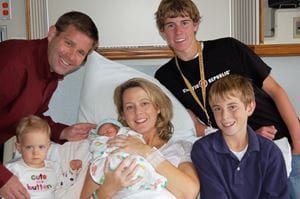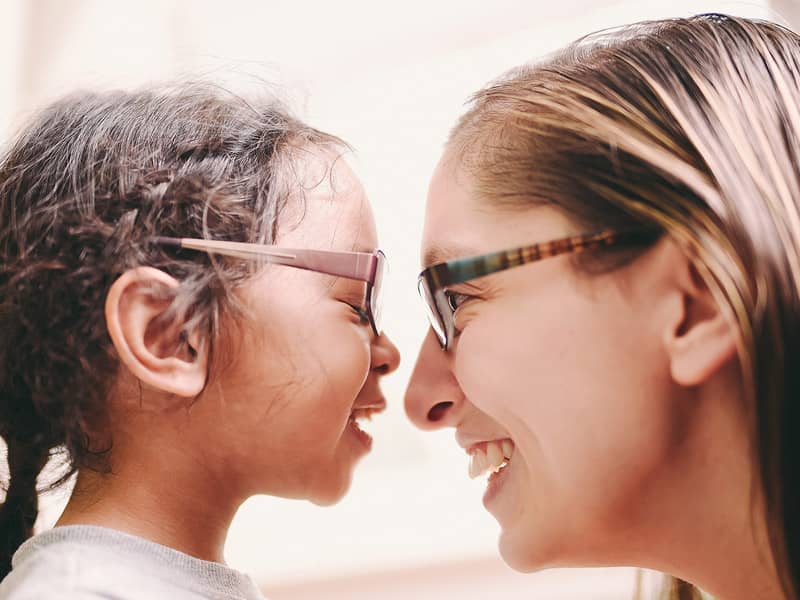
Jana Melpolder: You both have an incredible story. It’s amazing. Could give me a little bit of background to how this all came about?
Carolyn Savage: Sean and I have been married for 18 years and we knew prior to actually getting married that our fertility was so much threatened due to an early diagnosis. I had endometriosis. And so, we knew that we were going to have to get after building a family right away. Luckily I was five months pregnant on our first anniversary. We also were able to conceive our second son in 1996 the old-fashioned way as well. We thought maybe we had beaten the once-predicted diagnosis of infertility, but unfortunately when we went back to have our third child, we ran into some significant fertility problems. Then after ten years of trying, we turned to the technology of In Vitro Fertilization. On our third attempt at IVF we were lucky enough to get pregnant and we delivered our daughter in 2008. From that original IVF cycle we had made too many embryos during that cycle and so, seeing as how we respect life, we had those cryo-preserved for future pregnancy attempts. So in 2009 we went into do a procedure called a Frozen Embryo Transfer in which our embryos were supposed to have been thawed and transferred in an attempt to have another child. And unfortunately there was a mistake and they transferred the embryos of another couple.
Jana: And that resulted with you being pregnant with another couple’s embryo. I couldn’t even imagine what that would be like.
Carolyn: Yeah. It was a little bit stunning to say the least. It certainly wasn’t news that we ever expected to hear. When you go through In Vitro Fertilization there are a lot of ups and downs but really only two possible outcomes. One is you’re pregnant, or you’re not. Pregnant with the wrong baby isn’t exactly something that we would have expected or even ever considered before we entered into that realm of medicine. It is a highly unusual outcome; we’ve been told it’s 1 in 3 million. So it was very, very stunning.
Jana: Sean, you first received the news of this over the phone and you had to tell your wife. What was going through your mind at that point?
Sean Savage: I just knew that it was a life-changing situation as soon as I received the call. I wanted to get to Carolyn and tell her in person because I knew that it would just be such devastating news to deliver and receive that we just needed to be there together as a couple, to support each other and try to figure out what steps we would take, and how we would start to deal with this incredible situation.
Jana: How did your marriage become stronger through of all this?
Jana: I would think that your marriage is very connected to your faith. I understand that you both are Roman Catholic. What was the reaction of the church and the faith community in your hometown to all this?
Carolyn: Our faith community in our hometown was incredibly supportive. I don’t know how somebody without a strong core faith would be able to manage a crisis like this, or pretty much any crisis. I think at those times in our lives when we’re really challenged and kind of rocked, that’s when Sean and I kind of retreated to our core beliefs and really relied on our faith in God to first make the most loving decision, and second, in order to navigate this way in a very loving and generous manner. Sean mentioned earlier that there were some pitfalls along the way and I think those are to be expected with any kind of crises.
Jana: When Logan was finally born, what was going through your minds at that point?

Carolyn: You know we had worked really hard at making sure that Logan’s birth was celebrated and he was welcomed into this world surrounded in joy and love. So when he came out kicking and screaming, we were both smiles ear-to-ear. It was as miraculous as any other childbirth, and we have three other children, and we were incredibly thrilled. It was a major accomplishment for us to get him to be born. He was so healthy and it was such a great moment. About 10 minutes after his delivery they took him from the room [and] Sean accompanied him. And that was tough but I will say there was a presence of absolute witness to the work we were doing in that OR that day. Sean, myself [and] our entire medical team [all] had strong convictions about what we were doing in bringing this little boy into this world and returning him to his genetic parents. When they left it was tough. I think at that moment I can sure remember closing my eyes and feeling proud of what we had done, and thanking God for allowing him to come into this world in such a healthy manner.
Jana: It’s wonderful that he’s a healthy baby boy. How many times have you been able to see Logan?
Sean: Going back to that delivery, I just think the miracle of childbirth and every time we’ve been in for a delivery of one of our children, and also of Logan, it’s just one of the most amazing moments, and when you’re there, you realize the presence of God in that process. In taking Logan to his genetic parents that day I felt so much the sacrifice that Carolyn had made and felt like I was representing her in that process of handing him over. Although it was a loss for us, it was an amazing gift. I think for the Morales it was a gift of life. And I think it’s one thing for folks to talk about their beliefs or to espouse I think living your faith is so critical. As we’ve gone through this we’ve received so much support from so many people. We had a spiritual-based counselor through this entire process. As we launch and go through this book process, we’re really looking for the support of believers everywhere to hold up the faith of your life, and the faith of your marriage, and the incredible sacrifice of mothers. What they do is amazing. In our book we really espouse those values and try to live those as best we could. I think that’s a big part of what “Inconceivable” is all about. It’s on the feedback we’re getting from people. That’s really heartwarming as well.
Jana: That’s great. It’s a wonderful message to share with people.
Carolyn: Also, you know what I think? I hope that not only will people who are undergoing In Vitro Fertilization take a look at our book and understand the questions that need to be asked in clinics. Look at the book and make sure that their protocols are as tight as they should be. But also, I think, there’s a lesson in there about making sure that we ask appropriate questions of our medical providers, regardless of what medical treatments we are receiving. I know that it can be intimidating to question – we are taught such deference to doctors as such a young age, but we do have to remember that we are our own best advocates and it’s well within our rights, and really our responsibility, to make sure that all the safety measures, regardless of what the area of medicine is, are in place so that our families, our children, and ourselves are protected. In addition, I think our story is really a witness to standing up for what you believe in. Even in the toughest of circumstances, we as Christians are capable to walking our talk. We have weak moments, sometimes; walking the talk is very, very difficult. But as long as we stay rooted in our beliefs and in our faith and in our belief in God and our belief in Jesus Christ, we can get incredible work done. But it takes a lot of perseverance. And I think when we do that, we allow God to work through us. So that’s a big part of our book, a big part of our message.
Jana: I think the book will reach out to a lot of couples, especially believers, with this message.
Sean: Yes, we really hope so. It touches, I think, many areas that people can garner a lot out of it and apply it to their own lives. We want to engage folks and we have our website http://www.inconceivablebook.com We have a place on there called “Inconceivable Choices”. It’s a place for folks to go to share difficult choices that they’re facing, challenges in their life, so that they can gather support from others, and feedback. I think it’s really important when you go through something as we have. We received so much help from so many people. That’s what we’re trying to [do]; in return, do for others with http://inconceivablebook.com/inconceivable-choices It’s just something that we really want to give back in this process. That hopefully is one of the lasting legacies of this.

Jana: You are right that we shouldn’t try to go through things alone but instead we should reach out for help. Is there anything else that you wanted to mention?
Sean: I would say that more than anything, we ask people to engage us, and engage the book. I really think as a community of believers we need to be there to support situations and folks that are holding up their faith, and for some reason, Carolyn and I have a platform right now, and there’s people around the world that are giving us attention. Long after they forget who our names are, I hope they remember the story. I hope they remember how important life was to our story, and how important marriage was, and how important our respect for motherhood and parenthood is. I think all those are just so important in society. In some respects society is losing respect for a number of those. Our hope is that we get the support of believers and we hold [these] up as being really important.

